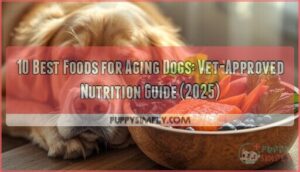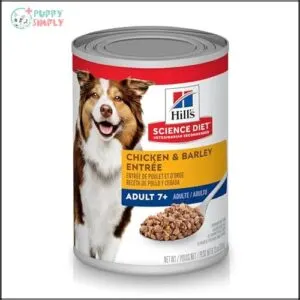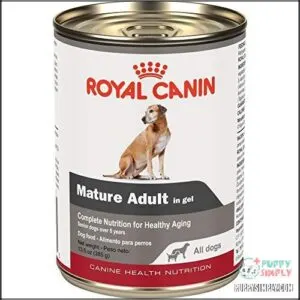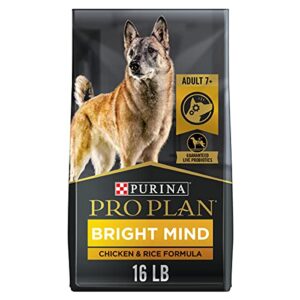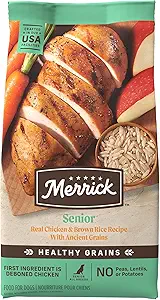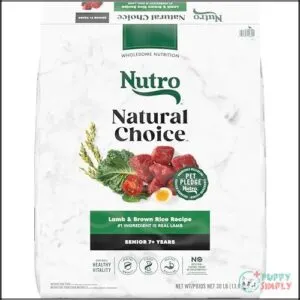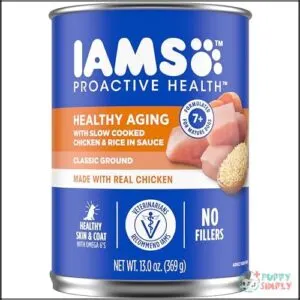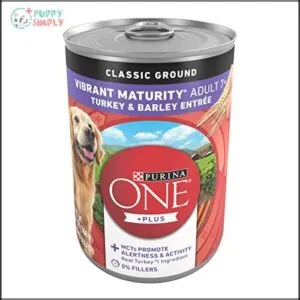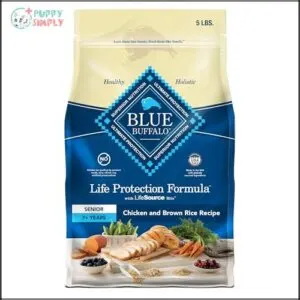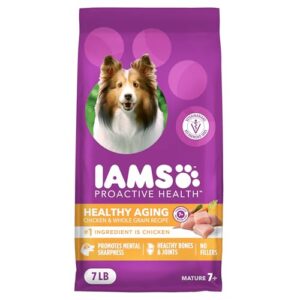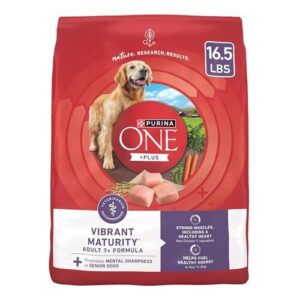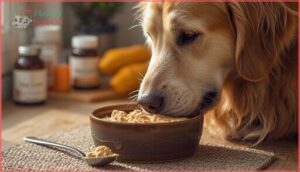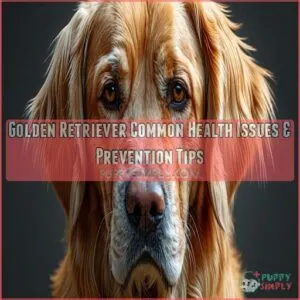This site is supported by our readers. We may earn a commission, at no cost to you, if you purchase through links.
Your dog’s graying muzzle and slower morning stretches signal more than just the passage of time—they’re your cue to rethink what’s in the food bowl. As dogs age, their bodies process nutrients differently, with metabolism slowing by approximately 20% and muscle mass declining without adequate protein support.
The best food for aging dogs tackles these physiological shifts through targeted nutrition: high-quality proteins to preserve lean muscle, glucosamine and chondroitin for joint comfort, omega-3 fatty acids to reduce inflammation, and antioxidants to combat cellular damage.
Choosing the right senior formula means understanding your dog’s specific needs, from breed size and activity level to existing health conditions, so you can support their golden years with meals that keep them comfortable, mobile, and thriving.
Table Of Contents
- Key Takeaways
- What Makes a Good Senior Dog Food
- When is a Dog Considered Senior?
- Nutritional Needs of Aging Dogs
- Top 10 Best Foods for Aging Dogs
- 1. Hill’s Science Diet Senior Dog Food
- 2. Royal Canin Mature Dog Food
- 3. Purina Pro Plan Senior Dog Food
- 4. Merrick Healthy Grains Dog Food
- 5. Nutro Natural Senior Dog Food
- 6. Iams Healthy Aging Dog Food
- 7. Purina One Senior Dog Food Turkey Barley
- 8. Blue Buffalo Senior Dog Food
- 9. Iams Mature Adult Dog Food
- 10. Purina One Senior Dog Food
- Comparing Dry, Wet, and Fresh Senior Dog Foods
- How to Switch to Senior Dog Food
- Managing Weight and Appetite in Older Dogs
- Supplements and Additives for Senior Dogs
- Tips for Choosing Quality Senior Dog Food
- Frequently Asked Questions (FAQs)
- What is the best thing to feed an old dog?
- Should I feed my senior dog wet or dry food?
- What is good for aging dogs?
- What foods help dogs live longer?
- How to assess dog food quality?
- Are grain-free diets beneficial for older dogs?
- What are signs of food allergies in seniors?
- How often should senior dogs eat?
- What to look for in ingredient labels?
- Can senior dogs eat homemade food safely?
- Conclusion
Key Takeaways
- Senior dogs need high-quality protein (1.0–1.6 grams per kilogram daily) to preserve lean muscle, alongside glucosamine, chondroitin, and omega-3 fatty acids to support joint comfort and reduce inflammation as metabolism slows by approximately 20%.
- The transition to senior status varies dramatically by breed size—giant breeds may need specialized nutrition as early as 5–6 years, while small breeds can wait until 10–11 years, making it essential to watch for signs like reduced mobility, weight changes, and graying muzzles rather than relying solely on age.
- Top-rated senior dog foods like Hill’s Science Diet, Royal Canin, and Purina Pro Plan balance digestibility, joint support, and calorie control, though you’ll need to choose between dry kibble for convenience, wet food for hydration and palatability, or fresh options based on your dog’s dental health and appetite.
- Switching to senior food requires a gradual 7–14 day transition with careful monitoring of appetite and stool consistency, plus regular veterinary consultations to tailor portion sizes, manage weight, and address individual health conditions like kidney disease or cognitive decline.
What Makes a Good Senior Dog Food
Your senior dog’s nutritional needs aren’t the same as they were in their younger years, and choosing the right food can feel overwhelming when you’re faced with dozens of options at the pet store. A quality senior dog food should do more than just fill your dog’s bowl—it needs to support their aging body, maintain their energy levels, and help prevent common health issues that come with getting older.
Quality senior dog food should support your aging companion’s body, energy, and health—not just fill their bowl
Let’s look at the essential components that separate truly beneficial senior foods from the rest.
Key Nutrients for Aging Dogs
Senior dog nutrition centers on high-quality protein sources (1.0–1.6 grams per kilogram daily) to preserve lean muscle, omega fatty acids like EPA and DHA for joint comfort and brain health, and antioxidant benefits from vitamins C and E to fight oxidative stress.
You’ll also want glucosamine and chondroitin for cartilage support, plus prebiotic fibers that boost nutrient absorption in your aging companion’s digestive system.
Proper nutrition requires careful consideration of scientific information and clear science writing.
Joint and Mobility Support Ingredients
Your dog’s mobility depends on ingredients that protect cartilage and ease joint discomfort. Look for glucosamine and chondroitin, which studies show can improve movement and reduce pain in aging pets.
Omega-3 fatty acids (EPA and DHA) deliver anti-inflammatory benefits that support joint health, while green-lipped mussel extract and MSM offer additional cartilage care and pain management for senior dog nutrition.
Digestibility and Palatability Factors
Even the best nutrient requirements for senior dogs mean nothing if your companion won’t eat the meal. Senior digestion slows with age, so digestive enzymes and highly digestible proteins (like chicken or fish) improve nutrient absorption.
Food texture matters too—warming meals releases aroma, and soft pâtés help dogs with dental trouble. Palatability factors and digestive health work together for nutrition and diet success.
Understanding research methodology is essential for developing effective nutrition plans.
Antioxidants and Immune Support
As your dog ages, their immune system needs backup. Antioxidants like Vitamin C and E help combat oxidative stress and cellular damage, while selenium boosts antioxidant enzyme activity. Omega-3 fatty acids reduce inflammation, and glucosamine plus chondroitin support joints.
These immune boosters and antioxidant supplements work together to protect aging bodies from the inside out.
When is a Dog Considered Senior?
Determining when your dog becomes a senior isn’t as straightforward as circling a date on the calendar. The shift depends heavily on breed size, with larger dogs aging faster than their smaller counterparts.
Recognizing the specific signs of aging helps you adjust their nutrition before health issues take hold.
Typical Age Ranges by Breed Size
Your dog’s size plays a surprisingly large role in when you’ll need to switch to senior dog food. Here’s how aging patterns and lifespan expectations shift based on breed size factors:
- Small breeds (under 20 lbs) usually reach senior status around 10–11 years, with some toy breeds staying spry even longer
- Medium breeds (20–50 lbs) generally hit this landmark between 8–10 years
- Large breeds (50–90 lbs) often show size-related issues by 6–8 years
- Giant breeds (over 90 lbs) may need senior dog food as early as 5–6 years due to faster metabolic aging
These health landmarks aren’t just about birthdays—they reflect real changes in your dog’s nutritional needs and overall canine nutrition requirements as their body systems mature at different rates.
Signs Your Dog is Entering Senior Years
How do you know it’s time to adjust your dog’s diet? Watch for a slowdown in daily play and exercise, stiffness when getting up from rest, or subtle weight changes that creep up despite the same food portions.
You might notice thinning fur, a graying muzzle, or your dog startling more easily when you approach—all common aging symptoms that signal it’s time to prioritize senior care and dog wellness through better health monitoring.
Health Changes in Aging Dogs
As your dog’s body shifts with time, you’ll see lean muscle fade while fat mass climbs, slowing their metabolism and changing how much fuel they actually need. Osteoarthritis creeps in, stealing mobility and sparking senior health issues that demand joint mobility support.
Cognitive decline may blur their sharpness, and their gut won’t absorb nutrients like it used to, making geriatric dog nutrition and aging dog care essential for canine aging and health.
Nutritional Needs of Aging Dogs
Your senior dog’s body doesn’t process nutrients the same way it did during their younger years, and that means their diet needs to shift accordingly. Getting the balance right involves adjusting protein levels, managing calories to prevent weight gain, and carefully monitoring certain minerals that can impact organ health.
Let’s break down the three most important nutritional adjustments you’ll need to keep in mind as your dog ages.
Protein Requirements for Senior Dogs
Your aging companion needs protein just as much—or even slightly more—than in their younger years. Aim for 1.0 to 1.8 grams per kilogram of body weight daily to preserve muscle health and combat age-related muscle loss.
High-quality animal-based sources like chicken or fish deliver essential amino acids, especially leucine, which promotes muscle protein synthesis and helps your dog maintain strength through their golden years.
Calorie Adjustments for Weight Control
Did you know your companion’s metabolic rate drops by up to 30% with age? That means Caloric Intake needs a serious rethink.
Weight Management for Senior Dogs hinges on Portion Control—aim for a 20-30% reduction in daily calories.
Senior Diets and Senior Dog Food formulated for Healthy Feeding help meet Nutritional Needs without risking obesity or muscle loss.
Managing Fat, Phosphorus, and Sodium Intake
Your companion’s kidneys, heart, and joints need more than just fewer calories—they need the right balance of Fat Reduction, Phosphorus Control, and Sodium Management.
- Moderate fat (usually 10–15% dry matter) aids Calorie Balance without overloading aging organs
- Limit phosphorus below 0.5% to slow kidney disease progression
- Restrict sodium to manage blood pressure and fluid retention
- Add Omega Fatty Acids (EPA/DHA) for anti-inflammatory benefits
- Choose Senior Dog Food designed for Nutrient Optimization and your dog’s specific Nutritional Needs
Top 10 Best Foods for Aging Dogs
Now that you understand what your senior dog needs, let’s look at specific foods that deliver. The following ten options have been selected based on AAFCO nutritional standards, ingredient quality, and formulations that address common age-related health concerns.
Each product offers a different combination of joint support, digestibility features, and calorie management to match your dog’s individual needs.
1. Hill’s Science Diet Senior Dog Food
Hill’s Science Diet Senior Dog Food delivers balanced nutrition customized for dogs seven and older. You’ll find real chicken as the primary protein source, supporting lean muscle maintenance with approximately 18–26% protein content.
The formula includes glucosamine and chondroitin for joint comfort, along with omega-6 fatty acids and vitamin E for skin and coat health.
What sets this option apart is its emphasis on digestibility, using easily processed carbohydrates that won’t upset sensitive stomachs. With reduced calories and controlled phosphorus levels, it aids kidney function while helping your companion maintain a healthy weight.
| Best For | Senior dogs (7+) needing joint support, easier digestion, and weight management without sacrificing protein quality. |
|---|---|
| Brand | Hill’s Science Diet |
| Primary Protein | Chicken |
| Age Range | Senior 7+ |
| Food Form | Wet |
| Digestive Support | Easy-to-digest ingredients |
| Joint Support | Balanced minerals |
| Additional Features |
|
- Real chicken plus glucosamine and chondroitin work together to maintain muscle and ease joint discomfort in aging dogs.
- Easier on sensitive stomachs with digestible carbs and balanced minerals that support kidney and heart function.
- Reduced calories help prevent weight gain while omega-6s and vitamin E keep skin and coat looking healthy.
- Higher price point compared to many mainstream senior dog food brands.
- Some dogs might not love the texture or taste, especially if they’re picky eaters.
- Limited availability in stores may require ordering online or buying in bulk to get the best price.
2. Royal Canin Mature Dog Food
Royal Canin Mature Dog Food meets the needs of dogs five years and older with a loaf-style pâté that even fussy eaters find irresistible. The formula includes biotin for nervous system function and provides complete, balanced nutrition aligned with veterinary standards.
You’ll appreciate the fish oil and B vitamins that nourish skin and coat, while L-carnitine aids healthy fat metabolism—important for maintaining lean body condition.
At $46.68 for a 12-can pack (13.5 oz each), it’s pricier than some alternatives, but the highly palatable texture and appetite-stimulating properties make it worth considering for senior dog wellness.
| Best For | Dog owners with senior pets (5+ years) who struggle with picky eating or need targeted support for skin, coat, and metabolic health. |
|---|---|
| Brand | Royal Canin |
| Primary Protein | Chicken |
| Age Range | Senior 5+ |
| Food Form | Wet |
| Digestive Support | Stimulates appetite |
| Joint Support | Not specified |
| Additional Features |
|
- Highly palatable loaf texture that appeals to finicky eaters and can boost appetite in seniors
- Comprehensive formula with fish oil, B vitamins, L-carnitine, and biotin to support aging dogs’ specific needs
- Complete and balanced nutrition that meets AAFCO guidelines for senior dogs
- Higher price point at $46.68 for 12 cans compared to many competing wet foods
- Some customers have reported quality control issues like can inflation or products arriving near expiration
- May not work for dogs with specific dietary restrictions or certain health conditions
3. Purina Pro Plan Senior Dog Food
Purina Pro Plan Bright Mind 7+ offers specialized senior nutrition with botanical oils that support mental sharpness—particularly valuable if you’ve noticed your dog seems a bit foggy. You’ll find real chicken as the first ingredient, EPA and glucosamine for joints, and guaranteed live probiotics supporting digestion and immunity.
The 16-pound bag costs more than budget brands, but veterinary advice consistently points to this formula’s quality and feeding trials backing its benefits. For senior dog food that tackles cognitive health alongside physical wellness, this represents a solid pet care investment in healthy aging for dogs.
| Best For | Senior dogs showing signs of cognitive decline or owners wanting to proactively support their aging dog’s mental sharpness, joint health, and overall wellness. |
|---|---|
| Brand | Purina Pro Plan |
| Primary Protein | Chicken |
| Age Range | Senior |
| Food Form | Dry |
| Digestive Support | Guaranteed live probiotics |
| Joint Support | EPA and glucosamine |
| Additional Features |
|
- Contains botanical oils clinically shown to promote alertness and mental sharpness in dogs 7
- Real chicken leads the ingredient list with added EPA, glucosamine, and live probiotics for comprehensive senior support
- Backed by veterinary research and feeding trials, not just marketing claims
- Higher price point compared to standard senior dog foods may strain some budgets
- Ingredient quality concerns exist among some pet owners despite the brand’s veterinary backing
- Not suitable for dogs with specific food sensitivities or allergies—vet consultation recommended before switching
4. Merrick Healthy Grains Dog Food
Merrick Healthy Grains Senior Formula offers real deboned chicken as the first ingredient, paired with nutrient-dense ancient grains like brown rice and oats that support healthy digestion without compromising senior nutrition.
You’ll get substantial joint support with high levels of glucosamine and chondroitin, plus omega-3 and omega-6 fatty acids maintaining skin and coat health. The 25-pound bag contains no potatoes, peas, or artificial additives—important for dogs with sensitivities.
Protein levels around 24-30% help preserve lean muscle mass, though some owners find the price higher than budget options.
| Best For | Senior dogs needing extra joint support and digestive care, especially those with sensitivities to common fillers like potatoes or peas. |
|---|---|
| Brand | Merrick |
| Primary Protein | Chicken |
| Age Range | Senior |
| Food Form | Dry |
| Digestive Support | Ancient grains |
| Joint Support | Glucosamine and chondroitin |
| Additional Features |
|
- Real deboned chicken and ancient grains deliver balanced nutrition with 24-30% protein to maintain muscle mass in aging dogs
- High glucosamine and chondroitin levels specifically target hip and joint health concerns common in seniors
- Omega fatty acids plus grain-inclusive formula support healthy skin, coat, and digestion without artificial additives
- Higher price point compared to budget-friendly senior dog food options
- Some dogs experience digestive upset or diarrhea during transition or continued feeding
- Occasional quality control complaints about smell or consistency, and not suitable for dogs with chicken allergies
5. Nutro Natural Senior Dog Food
Lamb is the star ingredient in Nutro Natural Choice Senior Dog Food, giving your older companion high-quality protein without artificial flavors or fillers. The formula delivers guaranteed antioxidant levels—vitamin E and selenium—to maintain senior health and immunity. Calcium and phosphorus support strong bones, though some dogs may need separate glucosamine supplementation for joint comfort.
You’ll find beet pulp supporting digestive health alongside omega-3 and omega-6 fatty acids that keep skin and coat vibrant. It meets nutritional needs for aging dogs while remaining gentle on sensitive stomachs.
| Best For | Senior dogs with sensitive skin or stomachs who need high-quality protein, digestive support, and immune-boosting antioxidants without artificial additives. |
|---|---|
| Brand | Nutro |
| Primary Protein | Lamb |
| Age Range | Senior |
| Food Form | Dry |
| Digestive Support | Beet pulp prebiotic |
| Joint Support | Calcium and phosphorus |
| Additional Features |
|
- Real lamb as the first ingredient with no artificial flavors, colors, or fillers
- Supports healthy digestion with natural prebiotic fiber and includes omega fatty acids for skin and coat health
- Provides guaranteed antioxidant levels (vitamin E and selenium) to boost immunity in aging dogs
- Some dogs may refuse to eat it or experience digestive issues despite the gentle formula
- Does not include glucosamine in all formulations, requiring separate supplementation for joint support
- Higher price point compared to other senior dog food brands
6. Iams Healthy Aging Dog Food
Real chicken leads the ingredient list in Iams Healthy Aging Dog Food, providing protein to maintain lean muscle mass as your senior dog’s activity slows. The formula includes omega fatty acids (EPA and DHA) that support joint mobility and mental sharpness, plus natural sources of glucosamine and chondroitin for bone health.
You’ll find antioxidants strengthening immune function alongside fiber-rich carbohydrates that improve stool quality.
This complete and balanced senior dog food meets AAFCO standards while addressing multiple aging care needs through thoughtful pet dietetics and Iams proactive health principles.
| Best For | Senior dogs needing joint support and muscle maintenance with a formula that’s easy on aging digestive systems. |
|---|---|
| Brand | IAMS |
| Primary Protein | Chicken |
| Age Range | Senior |
| Food Form | Wet |
| Digestive Support | High fiber |
| Joint Support | Glucosamine and chondroitin |
| Additional Features |
|
- Real chicken as the first ingredient delivers quality protein to preserve lean muscle as dogs age
- Omega fatty acids plus glucosamine and chondroitin work together to support both joints and cognitive function
- Meets AAFCO standards while including fiber and antioxidants that address multiple senior health needs at once
- Contains meat by-products and fillers that some pet owners prefer to avoid
- Texture and smell may not appeal to picky eaters, requiring patience during transition
- Not ideal for dogs with specific allergies or those needing specialized kidney/heart formulas
7. Purina One Senior Dog Food Turkey Barley
When your aging companion needs balanced nutrition without the premium price tag, this turkey and barley formula delivers measurable support for senior health. You’ll get real turkey as the primary protein source, maintaining lean muscle while meeting AAFCO standards for adult maintenance.
The recipe includes glucosamine for joint comfort, omega-3 fatty acids to calm inflammation, and antioxidants that strengthen your dog’s immune defenses.
Purina nutrition expertise shows in the digestible barley base, which furnishes steady energy without excess calories—practical pet care from a trusted pet nutritionist perspective.
| Best For | Senior dogs needing joint support and lean muscle maintenance on a budget-friendly diet with trusted nutritional backing. |
|---|---|
| Brand | Purina ONE |
| Primary Protein | Turkey |
| Age Range | Senior |
| Food Form | Wet |
| Digestive Support | Easy to digest |
| Joint Support | Not specified |
| Additional Features |
|
- Real turkey as the first ingredient provides quality protein to maintain muscle mass in aging dogs
- Includes glucosamine and omega-3s to support joint health and reduce inflammation
- Digestible barley formula offers steady energy without excess calories, helping prevent senior weight gain
- Some dogs may refuse it due to taste or smell preferences
- Can trigger digestive upset like diarrhea in sensitive stomachs
- Requires refrigeration after opening, which adds a storage step
8. Blue Buffalo Senior Dog Food
When your faithful companion reaches those golden years, you want food that truly nourishes their aging body. Blue Buffalo Senior Dog Food delivers chicken-first protein paired with glucosamine and chondroitin to cushion those stiff joints your dog might be experiencing.
You’ll find omega fatty acids that calm inflammation, plus vitamin E and beta-carotene to fortify immune defenses.
The calorie-adjusted formula helps maintain healthy weight without sacrificing senior nutrition, and there’s prebiotic fiber to ease digestion—practical dog wellness from a quality brand committed to pet care.
| Best For | Senior dogs needing joint support and weight management with a protein-rich formula that’s easy on sensitive stomachs. |
|---|---|
| Brand | Blue Buffalo |
| Primary Protein | Chicken |
| Age Range | Senior |
| Food Form | Dry |
| Digestive Support | Natural ingredients |
| Joint Support | Glucosamine and chondroitin |
| Additional Features |
|
- Real chicken as the first ingredient with added glucosamine and chondroitin for joint health and mobility
- Calorie-adjusted formula helps maintain healthy weight while supporting immune system with antioxidants
- Includes prebiotic fiber for digestive health and contains no artificial preservatives, corn, wheat, or soy
- Higher price point compared to other senior dog food brands
- Kibble size may be too large for smaller senior dogs or those with dental issues
- Limited availability in some retail locations and may not suit dogs with chicken allergies
9. Iams Mature Adult Dog Food
If you’re searching for a senior dog food that balances quality with accessibility, Iams Mature Adult Dog Food might be exactly what your aging companion needs. This formula delivers customized protein levels to sustain lean muscle, reduced fat content to manage weight, and glucosamine plus chondroitin to support those creaky joints.
You’ll appreciate the omega fatty acids for skin health and antioxidants that strengthen immune function. Iams Nutrition emphasizes digestibility with optimized carbohydrate sources, making it a practical choice for dog wellness during those golden years.
| Best For | Senior dogs who need joint support, weight management, and easily digestible nutrition without breaking the bank. |
|---|---|
| Brand | IAMS |
| Primary Protein | Chicken |
| Age Range | Adult |
| Food Form | Dry |
| Digestive Support | Natural fiber prebiotics |
| Joint Support | Not specified |
| Additional Features |
|
- Includes glucosamine and chondroitin to help with achy joints and mobility issues
- Reduced fat and tailored protein levels keep aging dogs at a healthy weight while maintaining muscle
- Widely available at most pet stores and online, making it easy to grab when you need it
- Some owners have mentioned spotty availability or shipping problems depending on location
- May not cut it for dogs with serious dietary restrictions or health conditions
- Quality might not match up to higher-end brands if you’re looking for premium ingredients
10. Purina One Senior Dog Food
When your older dog needs reliable nutrition without breaking the bank, Purina One Senior Dog Food delivers balanced support through real chicken as the primary ingredient. This formula incorporates glucosamine and chondroitin for joint health, plus MCT-rich oils that promote mental sharpness—a standout feature for cognitive wellness.
You’ll find omega-6 fatty acids supporting coat quality and antioxidants strengthening immunity.
While Purina Pro Plan offers premium alternatives, Purina One provides solid dog food for older dogs at accessible price points, making quality pet care achievable for more families facing senior health challenges.
| Best For | Budget-conscious pet parents looking for a dependable senior dog food that supports joint health, mental sharpness, and overall wellness in aging dogs. |
|---|---|
| Brand | Purina ONE |
| Primary Protein | Chicken |
| Age Range | Senior |
| Food Form | Dry |
| Digestive Support | Easily digestible formula |
| Joint Support | Natural glucosamine sources |
| Additional Features |
|
- Real chicken as the first ingredient delivers high-quality protein to maintain muscle mass and heart health
- MCT-rich vegetable oils promote mental sharpness and cognitive function in older dogs
- Natural glucosamine sources support joint health and mobility while omega-6 fatty acids help maintain healthy skin and coat
- Some customers have experienced delivery issues with no compensation offered
- May not work for dogs with specific food allergies or sensitivities
- Ingredients and nutritional content can vary between batches, requiring vigilance from pet owners
Comparing Dry, Wet, and Fresh Senior Dog Foods
You’ll find senior dog food in three main formats, and each one has its own strengths depending on your dog’s specific needs. Dry kibble, wet food, and fresh options all offer different advantages for aging dogs, from convenience and cost to moisture content and palatability.
Let’s look at how each format stacks up so you can make the best choice for your senior companion.
Pros and Cons of Dry Kibble
Dry kibble offers a convenient way to support your senior dog’s health, but it’s not perfect for every pup. Here’s what you need to know:
| Feature | Advantages | Considerations |
|---|---|---|
| Nutrient Balance | Fortified with glucosamine, chondroitin, and antioxidants for joint support and immune health | Supplementation levels vary notably between brands |
| Dental Health | Some formulas reduce plaque buildup through texture | Hard kibble may worsen dental wear in dogs with existing tooth issues |
| Senior Appetite | Affordable, easy portion control for weight management | Lower palatability can discourage eating in dogs with reduced smell |
| Digestibility | High-fiber options support gut health and satiety | Moisture content is lower than wet food, potentially affecting hydration |
Your dog’s chewing ability and taste preferences should guide your choice.
Benefits of Wet and Canned Options
If your senior pup turns their nose up at kibble, wet food might be your answer. Canned diets deliver higher moisture content—often 75-80%—which helps with senior hydration, especially if your dog forgets to drink enough water throughout the day.
Here’s why wet food benefits aging dogs:
- Enhanced palatability factors make meals irresistible even when appetite fades
- Higher protein density maintains lean muscle without excess calories
- Softer textures accommodate dental issues and sensitive gums
- Glucosamine and omega fatty acids in senior formulas target joint and cognitive health
- Easier digestion means fewer tummy troubles for sensitive systems
Many dog food reviews highlight that moisture-rich options encourage consistent eating, which matters when maintaining your companion’s strength and vitality becomes challenging.
Fresh and Dehydrated Food Choices
Beyond canned meals, fresh diets and dehydrated options offer concentrated senior nutrition with impressive nutrient retention. Fresh food choices deliver high moisture content—boosting food hydration naturally—while dehydrated recipes rehydrate before serving, preserving micronutrients better than heavily processed kibble.
Pet health and wellness experts note both formats support aging metabolism, though dog food reviews emphasize verifying AAFCO standards and consulting your vet before switching.
| Food Type | Key Senior Benefit |
|---|---|
| Fresh Diets | High moisture aids hydration, gentle digestion |
| Dehydrated Options | Concentrated nutrients, shelf-stable convenience |
| Both Formats | Retain vitamins better than standard kibble |
| Veterinary Guidance | Ensures balanced senior dog food for health needs |
Suitability for Dogs With Dental Issues
When your dog’s mouth becomes tender with age, soft foods make mealtime comfortable again. Pate textures or ground formulas reduce chewing effort, while high moisture content eases swallowing—critical for senior dog health and nutrition.
Three dental-friendly priorities:
- Soft foods with pliable consistency minimize pain during eating
- Calorie control prevents obesity-related stress on aging joints and gums
- Dental diets with omega-3s support gum health and reduce inflammation
Senior chews should remain minimal; focus on nutrient-dense dog food for older dogs and seniors instead.
How to Switch to Senior Dog Food
Switching your dog to a senior formula isn’t something you should rush through in a day or two. A sudden diet change can upset your dog’s stomach and make the shift stressful for both of you.
Here’s how to move to a senior food safely while keeping your dog comfortable and healthy throughout the process.
Gradual Diet Transition Steps
Switching your dog’s diet isn’t a race—think of it as a gentle handoff rather than a sudden leap. Begin by mixing a small portion of the new senior dog food with the current diet, gradually increasing the ratio over 7 to 14 days.
This shift timing aids nutrient balance and caloric adjustment while minimizing food sensitivity and digestive upset, essential elements of senior dog care and nutrition for senior dogs.
Monitoring Appetite and Digestive Changes
After you’ve made the switch, watch your dog’s eating habits closely. Track daily food intake, noting any shifts in appetite or interest in meals—persistent refusal lasting 48–72 hours warrants a vet call.
Monitor stool consistency and frequency for digestive issues, as gut health reflects how well senior nutrition aids aging dogs.
These feeding strategies help safeguard dog health and enhance pet care and nutrition for seniors.
Consulting Your Veterinarian for Guidance
Before finalizing your senior dog’s nutrition plan, schedule a veterinary consultation to guarantee proper pet care and maintenance. Your vet provides essential veterinary guidance through thorough health assessments that reveal age-related changes affecting your dog’s dietary needs.
During this pet consultation, discuss:
- Comorbid conditions like kidney or liver issues that influence senior pet care choices
- Target calorie goals and feeding frequency for your senior health plan
- Joint support supplementation recommendations based on veterinary medicine protocols
- Contraindicated ingredients that may interact with current medications
- Customized nutrition plans addressing your dog’s specific veterinary care requirements
Managing Weight and Appetite in Older Dogs
As your dog ages, maintaining a healthy weight becomes trickier—metabolism slows down, activity levels drop, and sometimes appetite changes in unexpected ways. Whether you’re dealing with a picky eater who’s losing weight or a senior who’s packing on pounds, you’ll need to adjust your approach to feeding.
Here’s how to manage portion sizes, address appetite issues, and choose the right foods for weight control in older dogs.
Adjusting Portion Sizes and Feeding Frequency
As your dog’s metabolism slows by 10-20% with age, calorie management becomes essential for maintaining body condition. You’ll want to shift from two daily meals to three smaller portions, measuring each serving with a kitchen scale for accurate portion control.
Monitor weight weekly and adjust calorie intake by 5-10% as needed, consulting your vet during each annual vet visit to balance meal frequency with changing nutritional needs.
Identifying and Addressing Appetite Loss
When your senior dog turns away from meals or shows less interest in treats, don’t dismiss it as simple pickiness—appetite loss in aging dogs often signals dental disease, kidney issues, or digestive problems. Watch for lethargy at mealtimes or food aversion lasting several days.
Schedule a veterinary exam to rule out nutrient deficiency, then try warming food or adding low-sodium broth to address senior nutrition challenges.
Low-Calorie Foods for Overweight Seniors
Overweight seniors need calorie restriction—usually 15-25% fewer calories than standard formulas—while preserving lean body mass through balanced protein (18-25%). Proper senior pet nutrition and health depends on matching calorie intake to your dog’s slower metabolism, preventing obesity while supporting healthy aging through senior diets rich in digestible nutrients.
Weight management diets for aging dogs should include:
- High-fiber ingredients that promote satiety without excess calorie intake
- Lean protein sources (chicken, turkey, fish) supporting muscle during loss
- Controlled portions measured with scales, not guesswork
- Omega-3 fatty acids reducing inflammation affordably
- Veterinarian monitoring every 2-4 weeks for nutrient balance adjustments
Supplements and Additives for Senior Dogs
As your dog ages, their body doesn’t absorb or utilize nutrients the same way it once did, and that’s where targeted supplements can make a real difference. Many senior dog foods include these additives right in the formula, but you might also consider standalone supplements after talking with your vet.
Let’s look at three key supplements that support your aging dog’s joints, inflammation response, and brain health.
Glucosamine and Chondroitin for Joints
You’ll find glucosamine and chondroitin in many joint health supplements, often combined at dosages around 500 mg and 400–600 mg respectively for smaller dogs. These cartilage repair compounds may improve synovial fluid production and ease discomfort in osteoarthritis management, though results vary by individual.
They’re generally safe for canine joint care, with occasional mild stomach upset—always consult your vet before starting anti-inflammatory therapies.
Omega-3 Fatty Acids for Inflammation
Omega-3 fatty acids—particularly EPA and DHA from fish oil—reduce inflammatory markers like TNF-alpha and IL-6 in your dog’s tissues, offering genuine anti-aging effects. These omega fatty acids compete with inflammatory compounds in cell membranes, supporting joint health and mobility.
Look for:
- Fish oil supplements with 100–300 mg combined EPA/DHA per kilogram body weight daily
- Clear label specifications for omega-3 sources and purity testing
- Gradual introduction to avoid mild digestive upset
Your vet can adjust dosing for ideal inflammation reduction.
Antioxidants for Cognitive Health
Beyond joint and muscle support, your aging dog’s brain needs its own protective compounds. Antioxidants like vitamins E and C, along with omega fatty acids, combat oxidative stress in neural tissue, potentially slowing cognitive decline. Studies link DHA supplementation to improved behavioral scores in senior dogs, aiding neuroprotection and overall brain health through reduced neuroinflammation.
| Antioxidant | Primary Benefit | Typical Dosage Range |
|---|---|---|
| Vitamin E | Reduces oxidative stress | 100–400 IU daily |
| Omega-3 (DHA/EPA) | Aids brain function | 100–300 mg/kg body weight |
| Polyphenols | Neuroprotective effects | Varies by formulation |
| Lutein | Retinal and cognitive health | Found in antioxidant blends |
Choose supplements with third-party testing and clear EPA/DHA content customized to your dog’s weight, monitoring cognitive changes over six to twelve weeks.
Tips for Choosing Quality Senior Dog Food
Choosing the right senior dog food isn’t just about grabbing the first bag labeled “senior” off the shelf. You’ll want to look beyond marketing claims and focus on what actually matters—like nutritional standards, ingredient quality, and how well the food matches your dog’s specific health needs.
Here’s what to prioritize when you’re standing in that pet food aisle or scrolling through options online.
Importance of AAFCO Approval
When you’re choosing food for your aging companion, AAFCO approval acts as your nutritional safety net. This regulatory oversight ensures products meet established nutrient profiles for your dog’s life stage. Look for these key markers on labels:
- “Complete and balanced” statements referencing AAFCO standards
- Life-stage designations specifically for senior or maintenance needs
- Feeding trial documentation proving real-world effectiveness
- Clear nutritional facts panels showing protein, fat, and mineral levels
- Transparent formulation methods aligned with AAFCO guidelines
AAFCO standards give you confidence you’re providing adequate nutrition without guesswork.
Evaluating Ingredient Lists and Sourcing
Your dog’s ingredient list tells a story about quality. Named protein sources like chicken or salmon beat vague “meat by-products” every time. Check that suppliers provide traceability documentation and batch-level recall history—these sourcing standards protect your companion. Look for third-party certifications (NASC, GMP compliance) that verify supplier accountability and manufacturing integrity.
| What to Look For | Why It Matters |
|---|---|
| Named protein sources (chicken, salmon) | Higher digestibility and nutrient profiles for canine nutrition |
| Ingredient order (by weight) | Shows primary components in pet food formulation |
| Traceability documentation | Ensures supplier accountability and recall transparency |
| Third-party certifications | Validates sourcing standards and quality controls |
| Clear label claims with AAFCO statements | Confirms ingredient transparency and nutritional adequacy |
Understanding Feeding Trials and Quality Control
Manufacturers that conduct feeding trials—often spanning 6 to 12 months—demonstrate real-world nutrient adequacy beyond laboratory analysis. You’ll find AAFCO feeding trial statements on packaging, confirming dogs actually thrived on the recipe.
Quality control measures include batch testing for contaminants, digestibility trials to measure absorption rates, and third-party audits verifying manufacturing standards. These safeguards protect your senior companion’s health.
Tailoring Diet to Your Dog’s Health Needs
Every dog ages differently, so tailored feeding based on individual health monitoring makes all the difference in senior nutrition. Tailor your approach with these strategies:
- Adjust protein (moderate levels) to preserve muscle without straining kidneys
- Control portions for weight management and reduced joint stress
- Add glucosamine, chondroitin, and omega-3s for mobility support
- Choose highly digestible ingredients to ease gastrointestinal strain
- Include antioxidants (vitamins E, C) supporting immune function
Regular dietary adjustments aligned with veterinary guidance address canine health issues and fine-tune nutrient balance for aging dogs.
Frequently Asked Questions (FAQs)
What is the best thing to feed an old dog?
Your senior dog thrives on high-quality protein to maintain muscle, controlled calories to prevent weight gain, and joint-supporting ingredients like glucosamine—all delivered in easily digestible, antioxidant-rich formulas that support aging gracefully.
Should I feed my senior dog wet or dry food?
Both wet and dry food work for senior dogs—your choice depends on your dog’s needs.
Wet food benefits hydration and offers softer texture options, while dry kibble aids dental maintenance and portion control.
What is good for aging dogs?
Like a well-tuned engine, aging dogs need the right fuel: joint-supporting glucosamine and chondroitin, omega-3s for inflammation, antioxidants for cognitive health, and moderate protein to maintain lean muscle without straining kidneys.
What foods help dogs live longer?
Quality protein, omega-3 fatty acids, and antioxidants form the foundation of a longevity diet that promotes healthy aging.
Nutrient balance with moderate calories helps your senior maintain wellness through proper dog nutrition and dietary needs.
How to assess dog food quality?
When your neighbor’s terrier started refusing meals, the culprit wasn’t age—it was poor-quality kibble.
You can assess dog food quality by checking AAFCO approval, reviewing ingredient sourcing, and verifying feeding trials on labels.
Are grain-free diets beneficial for older dogs?
Grain-free diets aren’t universally beneficial for senior nutrition or canine health. While some aging dogs with specific dietary needs benefit, veterinary guidance ensures your pet food choice promotes dog wellness rather than following trends that may affect older dogs’ overall health.
What are signs of food allergies in seniors?
Watch for skin irritation, digestive upset, or respiratory signs like sneezing after meals.
Food allergy symptoms in senior dog health often include ear infections, paw licking, or facial swelling requiring dietary restriction plans.
How often should senior dogs eat?
Most senior dogs thrive on two smaller meals daily rather than one large portion, supporting steady digestion and caloric intake while preventing overnight hunger—especially helpful for dogs managing weight or chronic conditions.
What to look for in ingredient labels?
You’ll want to check the AAFCO statement first, then scan for named protein sources, omega fatty acids, glucosamine, and chondroitin.
Ingredient sourcing details and nutrient profiles help confirm manufacturing standards meet your aging dog’s dietary needs.
Can senior dogs eat homemade food safely?
Yes, but homemade diets for senior dogs require careful planning with a veterinary nutritionist to meet complete nutrition standards, prevent deficiencies like taurine or lysine, and address your aging dog’s specific health needs safely.
Conclusion
Think of your dog’s nutrition as the foundation beneath their paws—when it weakens, everything else becomes harder. The best food for aging dogs doesn’t reverse time, but it does reinforce what matters: mobile joints, steady energy, and resilient health.
You’ve spent years reading their needs through tail wags and quiet glances. Now, let the bowl reflect that same care, because nourishment this intentional becomes their greatest comfort.
- https://avmajournals.avma.org/view/journals/javma/256/12/javma.256.12.1335.xml?tab_body=pdf
- https://vetmed.vt.edu/people/faculty/freeman-mark.html
- https://www.fda.gov/animal-veterinary/animal-health-literacy/complete-and-balanced-pet-food
- https://thefarmersdog.otegtm.net/c/2442109/1640964/9488
- https://open-farm-pet.pxf.io/c/2442109/2832567/12719

